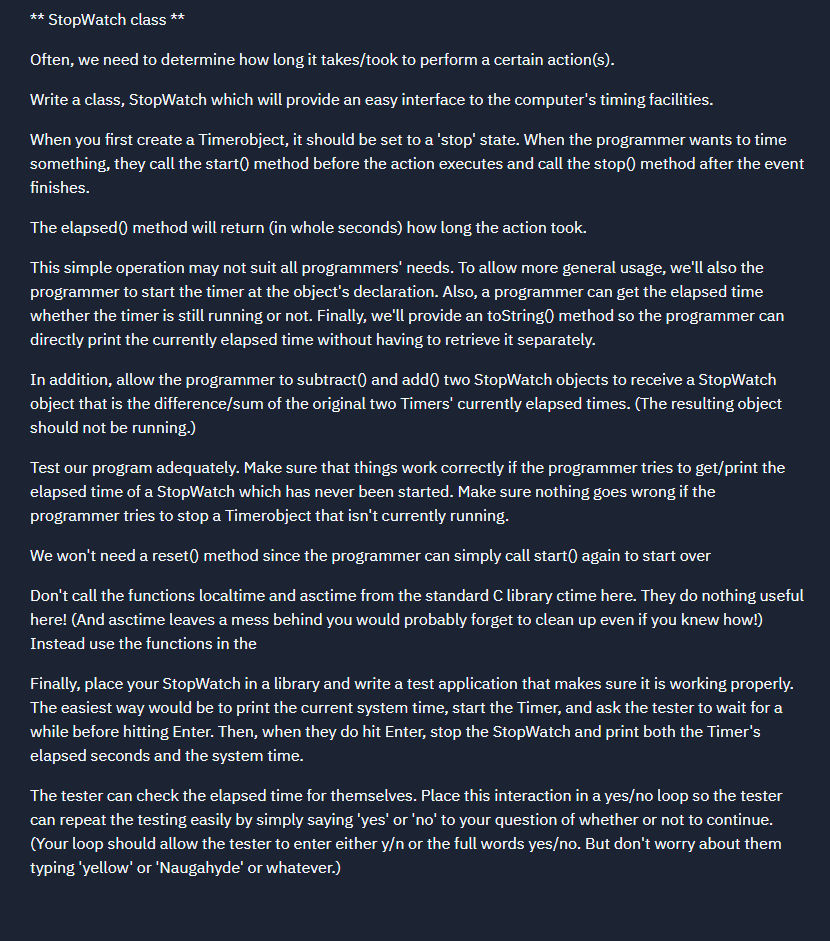大★: ** StopWatch class 大*
Computer Networking: A Top-Down Approach (7th Edition)
7th Edition
ISBN:9780133594140
Author:James Kurose, Keith Ross
Publisher:James Kurose, Keith Ross
Chapter1: Computer Networks And The Internet
Section: Chapter Questions
Problem R1RQ: What is the difference between a host and an end system? List several different types of end...
Related questions
Question

Transcribed Image Text:** StopWatch class **
Often, we need to determine how long it takes/took to perform a certain action(s).
Write a class, StopWatch which will provide an easy interface to the computer's timing facilities.
When you first create a Timerobject, it should be set to a 'stop' state. When the programmer wants to time
something, they call the start) method before the action executes and call the stop) method after the event
finishes.
The elapsed) method will return (in whole seconds) how long the action took.
This simple operation may not suit all programmers' needs. To allow more general usage, we'll also the
programmer to start the timer at the object's declaration. Also, a programmer can get the elapsed time
whether the timer is still running or not. Finally, we'll provide an toString() method so the programmer can
directly print the currently elapsed time without having to retrieve it separately.
In addition, allow the programmer to subtract) and add0 two StopWatch objects to receive a StopWatch
object that is the difference/sum of the original two Timers' currently elapsed times. (The resulting object
should not be running.)
Test our program adequately. Make sure that things work correctly if the programmer tries to get/print the
elapsed time of a StopWatch which has never been started. Make sure nothing goes wrong if the
programmer tries to stop a Timerobject that isn't currently running.
We won't need a reset) method since the programmer can simply call start) again to start over
Don't call the functions localtime and asctime from the standard C library ctime here. They do nothing useful
here! (And asctime leaves a mess behind you would probably forget to clean up even if you knew how!)
Instead use the functions in the
Finally, place your StopWatch in a library and write a test application that makes sure it is working properly.
The easiest way would be to print the current system time, start the Timer, and ask the tester to wait for a
while before hitting Enter. Then, when they do hit Enter, stop the StopWatch and print both the Timer's
elapsed seconds and the system time.
The tester can check the elapsed time for themselves. Place this interaction in a yes/no loop so the tester
can repeat the testing easily by simply saying 'yes' or 'no' to your question of whether or not to continue.
(Your loop should allow the tester to enter either y/n or the full words yes/no. But don't worry about them
typing 'yellow' or 'Naugahyde' or whatever.)
Expert Solution
This question has been solved!
Explore an expertly crafted, step-by-step solution for a thorough understanding of key concepts.
Step by step
Solved in 2 steps

Recommended textbooks for you

Computer Networking: A Top-Down Approach (7th Edi…
Computer Engineering
ISBN:
9780133594140
Author:
James Kurose, Keith Ross
Publisher:
PEARSON

Computer Organization and Design MIPS Edition, Fi…
Computer Engineering
ISBN:
9780124077263
Author:
David A. Patterson, John L. Hennessy
Publisher:
Elsevier Science

Network+ Guide to Networks (MindTap Course List)
Computer Engineering
ISBN:
9781337569330
Author:
Jill West, Tamara Dean, Jean Andrews
Publisher:
Cengage Learning

Computer Networking: A Top-Down Approach (7th Edi…
Computer Engineering
ISBN:
9780133594140
Author:
James Kurose, Keith Ross
Publisher:
PEARSON

Computer Organization and Design MIPS Edition, Fi…
Computer Engineering
ISBN:
9780124077263
Author:
David A. Patterson, John L. Hennessy
Publisher:
Elsevier Science

Network+ Guide to Networks (MindTap Course List)
Computer Engineering
ISBN:
9781337569330
Author:
Jill West, Tamara Dean, Jean Andrews
Publisher:
Cengage Learning

Concepts of Database Management
Computer Engineering
ISBN:
9781337093422
Author:
Joy L. Starks, Philip J. Pratt, Mary Z. Last
Publisher:
Cengage Learning

Prelude to Programming
Computer Engineering
ISBN:
9780133750423
Author:
VENIT, Stewart
Publisher:
Pearson Education

Sc Business Data Communications and Networking, T…
Computer Engineering
ISBN:
9781119368830
Author:
FITZGERALD
Publisher:
WILEY